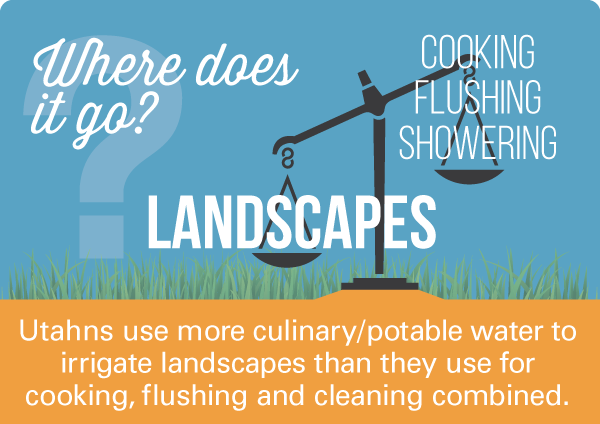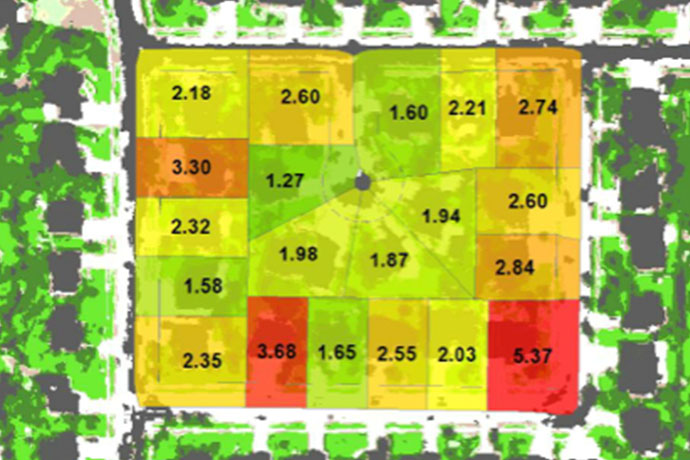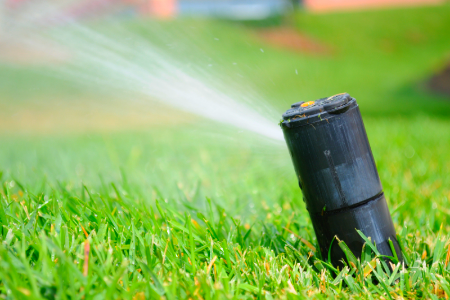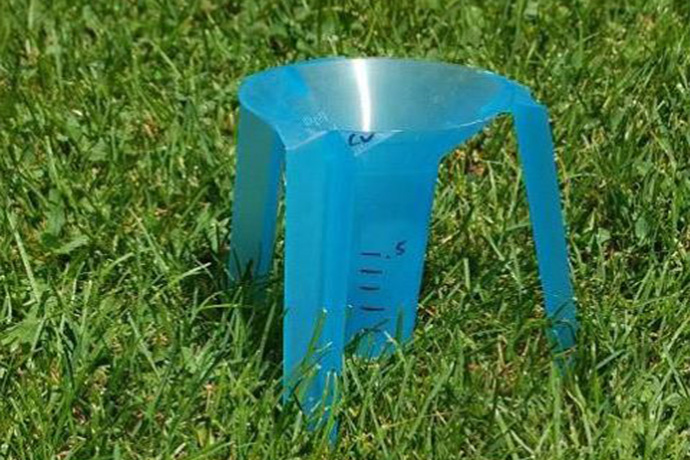Urban Water Conservation
Promoting urban water conservation is an important element of managing Utah’s scarce water resources in this rapidly growing and urbanizing state.
Careful use of urban water supplies will help to reduce pressures to transfer water from agricultural to municipal and industrial uses and will aid in avoiding negative environmental consequences from removing too much water from streams and aquifers.
 Water applied to landscapes constitutes approximately 65-75% of urban water demand. Reducing water used on established landscapes and promoting greater use of low-water plant material and landscape designs offer the greatest opportunities for reducing urban water demand.
Water applied to landscapes constitutes approximately 65-75% of urban water demand. Reducing water used on established landscapes and promoting greater use of low-water plant material and landscape designs offer the greatest opportunities for reducing urban water demand.
Urban landscapes contribute to the health of urban environments and their residents. Yet, they are often watered in excess of the actual water needs of the vegetation.
CWEL’s urban water conservation research integrates social and policy science with the plant and irrigation science of other research areas to provide an integrated approach to promoting water-efficient landscaping.
Our urban water conservation research investigates people’s watering behaviors and how those behaviors are shaped by their preferences, knowledge, and experiences as well as by site-specific characteristics of their landscapes (soil properties, plant characteristics, and irrigation systems).
We have developed a water use analysis and assessment tool, WaterMAPS™, to help municipal water managers identify locations with the greatest capacity to conserve water applied to landscapes and enable managers to direct and tailor their water conservation programs to those locations and users.
Related Peer-Reviewed Publications
2022
- Featured Collection Introduction: “Connecting Land and Water for Healthy Communities” J. Endter-Wada Utah State University, Faith Sternlieb, Sarah P. Church, Philip Stoker University of Arizona
- Transforming Institutions to Connect Land and Water for Healthy Communities J. Endter-WadaUtah State University, Faith Sternlieb, Lisa W. WelshUtah State University, Burton C. Suedel, Michelle Madeley
2021
- Plant biodiversity in residential yards is influenced by people's preferences for variety but limited by their income Allison Blanchette, Tara L.E. Trammell, Diane E. Pataki, Joanna Endter-Wada, Meghan L. Avolio; Landscape and Urban Planning
2020
A Multilevel Analysis of the Drivers of Household Water Consumption in a Semi-Arid Region Matthew Barnett, Douglas Jackson-Smith, Joanna Endter-Wada, and Melissa Haeffner; Science of the Total Environment
2019
- Utah State Capitol Grounds Landscape Water Use Assessment, Joanna Endter-Wada, Diana T. Wuenschell, Christine Garrard, Ellie Leydsman McGinty, Kelly Kopp, and Jennie Hoover; Research Report
- Implications of Nontraditional Housing Arrangements for Urban Water Management in the United States Intermountain West, Mathew J. Barnett, Douglas Jackson-Smith, and Joanna Endter-Wada;Society & Natural Resources
- Dynamics of Utah’s agricultural landscapes in response to urbanization: A comparison between irrigated and non-irrigated agricultural lands, Enjie Li, Joanna Endter-Wada, and Shujuan Li;Applied Geography
- Influencing water consumption through the Water Check Program. Helen Muntz and Kelly Kopp;Journal of Extension
2018
- Social Dimensions of Urban Flood Experience, Exposure, and Concern, Rebecca Hale, Courtney G. Flint, Douglas Jackson-Smith, and Joanna Endter-Wada; Journal of the American Water Resources Association
- Biodiverse cities: the nursery industry, homeowners, and neighborhood differences drive urban tree composition, Meghan L. Avolio, Diane E. Pataki, Tara L, E. Trammell, and Joanna Endter-Wada;Ecological Monographs
- Urban Agriculture and Small Farm Water Use: Case Studies and Trends from Cache Valley, Utah, Tyler Pratt, L. Niel Allen, David E. Rosenberg, Andrew A. Keller, and Kelly Kopp;Agricultural Water Management
2017
- Piping water from rural counties to fuel growth in Las Vegas, Nevada: Water transfer risks in the arid USA West. Lisa W. Welsh, and Joanna Endter-Wada; Water Alternatives
- Policy debates over the Southern Nevada Water Authority groundwater development project: Beneficial uses of water in a desert, Lisa W. Welsh, and Joanna Endter-Wada;Journal of the Southwest
- Social and geographic contexts of water concerns in Utah, Courtney G. Flint, Xin Dai, Douglas Jackson-Smith, Endter-Wada, J., Sara K. Yeo, Rebecca Hale, and Mallory K. Dolan; Society & Natural Resources
- Water-smart growth planning: linking water and land in the arid urbanizing American West, Li, E., Li, S., & Joanna Endter-Wada; Journal of Environmental Planning and Management
2016
- Water Management Decision Making in the Face of Multiple Forms of Uncertainty and Risk, Morey Burnham, Zhao Ma, Joanna Endter-Wada, and Tim Bardsley; Journal of the American Water Resources Association
- Differentiating Urban Forms: A Neighborhood Typology for Understanding Urban Water Systems, Douglas B. Jackson-Smith, Philip A. Stoker, Martin Buchert, Joanna Endter-Wada, Carlos V. Licon, Molly S. Cannon and Shujuan Li;Cities and the Environment (CATE)
2015
- Linkages Between Water Challenges and Land Use Planning in Megacities, Enjie Li, Joanna Endter-Wada, and Shujuan Li; Water Resources IMPACT
- The Untapped Potential of Water Conservation, Joanna Endter-Wada; Utah Science
- Tools for evaluating and monitoring effectiveness of urban landscape water conservation interventions and programs, Diana T. Glenn, Joanna Endter-Wada, Roger Kjelgren, and Christopher M.U. Neale;Landscape and Urban Planning
2014
- Clean Water Scarcity (1950s-present), Joanna Endter-Wada; CQ Press Guide to U.S. Environmental Policy
2013
- Water User Dimensions of Meter Implementation on Secondary Pressurized Irrigation Systems, Joanna Endter-Wada, Diana Glenn, Clayton Lewis, Roger Kjelgren, and Christopher Neale; Research Report for Weber Basin Water Conservancy District and the US Bureau of Reclamation
- Priorities for turfgrass management and education to enhance urban sustainability worldwide, Paul G. Johnson; Journal of Developments in Sustainable Agriculture
- Sustainable turfgrass management in an increasingly urbanized world, Paul Johnson, Frank S. Rossi, and Brian P. Horgan; Turfgrass Biology, Use and Management
2012
- Water efficient urban landscapes - integrating different water use categorizations and plant types, Hongyan Sun, Kelly L. Kopp, and Roger Kjelgren; HortScience
2011
- Quantifying Urban Landscape Water Conservation Potential Using High Resolution Remote Sensing and GIS, F. A. Farag, Christopher Neale, Roger Kjelgren, and Joanna Endter-Wada; Photogrammetric Engineering and Remote Sensing
- Estimating landscape irrigated areas and potential water conservation at the rural-urban interface using remote sensing and GIS, Fayek A. Farag, Christopher M. U. Neale, Roger Kjelgren, and Joanna Endter-Wada; Photogrammetric Engineering and Remote Sensing
- Water Use and the Key factor of Water Use of Ornamental Landscapes, Roger Kjelgren, Kelly Kopp, and Hongyan Sun; Spring Runoff Conference
- Value Landscape Engineering: identifying costs, water use, labor, and impacts to support landscape choice., Kelly Kopp, Larry Rupp, Paul G. Johnson, Roger K. Kjelgren, David E. Rosenberg, and Heidi Kratsch; Journal of the American Water Resources Association
- Predicting urban forest growth and its impact on residential landscape water demand in a semiarid urban environment, John H. Lowry Jr., R. Douglas Ramsey, and Roger K. Kjelgren; Urban Forestry & Urban Greening
- Implementing water conservation in an institutional setting; A case for situational problem solving, Douglas C. Kilgren, Joanna Endter-Wada, Roger K. Kjelgren, and Paul G. Johnson; Journal of the American Water Resources Association
2009
- Tools for evaluating native grasses as low maintenance turf, Landon D. Bunderson, Paul G. Johnson, Kelly L. Kopp, and Adam Van Dyke; HortTechnology
- A survey of apomixis and ploidy levels among Poa L. (Poaceae) using flow cytometry, Alicia Michelle Kelley, Paul G. Johnson, Blair L. Waldron, and Michael D. Peel; Crop Science
- Water deficit stress responses of three herbaceous native Australian ornamental species, Roger Kjelgren, Lixue Wang, and Daryl Joyce; HortScience
- Quantifying turfgrass-available N from returned clippings using anion exchange membranes, Kelly L. Kopp and Karl Guillard; International Turfgrass Society Research Journal
- Water-conserving landscapes: an evaluation of homeowner preference, Tony A. McCammon, Sandra T. Marquart-Pyatt, and Kelly L. Kopp; Journal of Extension
- Landscaping on the New Frontier: Waterwise Design for the Intermountain West, Susan E. Meyer, Roger K. Kjelgren, Darrel G. Morrison, and William A. Varga; All USU Press Publications
- Situational waste in landscape watering: residential and business water use in an urban Utah community, Joanna Endter-Wada, Judith Kurtzman, Sean P. Keenan, Roger K. Kjelgren, and Christopher M.U. Neale;Journal of the American Water Resources Association
2007
- Educating large landscape water users, Kelly L. Kopp, Teresa Cerny-Koenig, and Rachel Lopez; Journal of Extension
2006
- Stewardship and the Creation: LDS Perspectives on the Environment, Larry A. Rupp and Roger K. Kjelgren;Stewardship and the Creation: LDS Perspectives on the Environment
2004
- A team approach enhances statewide water issues programming, Richard Koenig, Teresa Cerny, Rick Heflebower, Nancy Mesner, Kelly L. Kopp, and Bob Hill; Journal of Extension
2003
- Quantifying Potential Urban Landscape Water Conservation through Billing Data Analysis in Layton, Utah, Roger Kjelgren, Fayek A. Farag, Christopher Neale, Joanna Endter-Wada, and Judith Kurtzman;Proceedings, AWWA Water Sources Conference: Reuse, Resources, Conservation
2000
- Water Conservation in Urban Landscapes, Roger Kjelgren, Larry Rupp, and Doug Kilgren; HortScience




